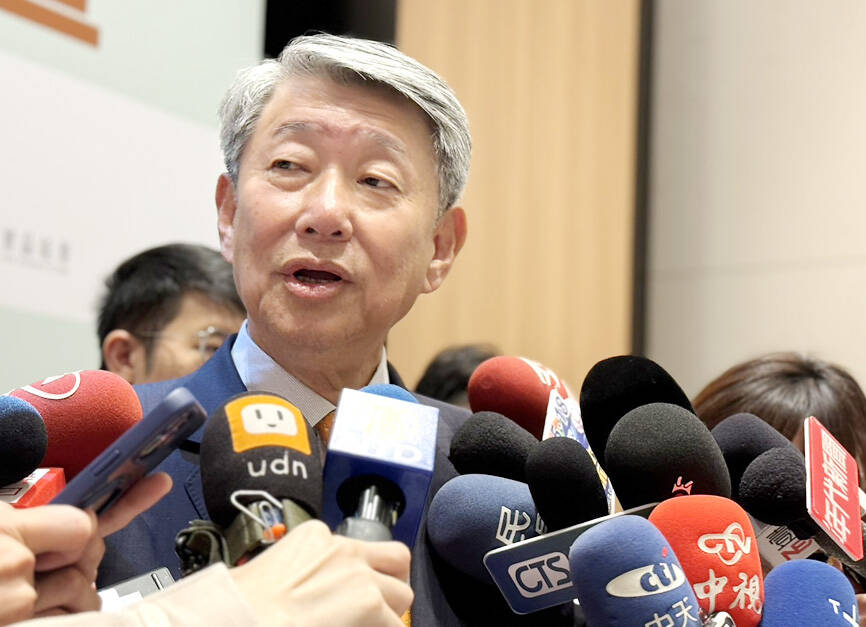Minister of Economic Affairs J.W. Kuo (郭智輝) yesterday said that his earlier comment about an assumed US$400 billion US investment was only an estimate and was based on references to other countries’ situations.
Kuo on Wednesday last week at a meeting with industry representatives said that Taiwan’s investment in the US could reach US$400 billion — a figure that he clarified yesterday was only an estimate.
While the government is seeking a US tariff rate below the current 20 percent, achieving it might require greater investment pledges in the US, Kuo told reporters on the sidelines of an energy forum in Taipei, citing the cases of the EU, Japan and South Korea.

Photo: CNA
In their trade negotiations with the US, the EU pledged US$600 billion in US investments, Japan pledged US$300 billion and South Korea US$350 billion, he said.
To lessen the tariff burden on companies, the government is considering assisting them to establish operations in the US, Kuo said.
As it typically takes about five years to set up a plant in the US, the government is establishing a trade promotion administration office in Texas this month and is exploring multiple avenues to help local manufacturers enter the US market, he said.
The government is considering assisting manufacturers by investing in distribution channels or warehousing units in major US cities and ports, which might enable them to secure lower tariff rates, he added.
The ministry would work closely with small and medium-sized enterprises to help them boost their competitiveness in eight areas: production, marketing, human resources, research and development, finance, administration, information technology and logistics, Kuo said.
The ministry would also support enterprises to integrate upstream and downstream supply chains, with the possibility of setting up similar trade promotion administration offices to the one in Texas in other US states, he added.

KEEPING UP: The acquisition of a cleanroom in Taiwan would enable Micron to increase production in a market where demand continues to outpace supply, a Micron official said Micron Technology Inc has signed a letter of intent to buy a fabrication site in Taiwan from Powerchip Semiconductor Manufacturing Corp (力積電) for US$1.8 billion to expand its production of memory chips. Micron would take control of the P5 site in Miaoli County’s Tongluo Township (銅鑼) and plans to ramp up DRAM production in phases after the transaction closes in the second quarter, the company said in a statement on Saturday. The acquisition includes an existing 12 inch fab cleanroom of 27,871m2 and would further position Micron to address growing global demand for memory solutions, the company said. Micron expects the transaction to

Vincent Wei led fellow Singaporean farmers around an empty Malaysian plot, laying out plans for a greenhouse and rows of leafy vegetables. What he pitched was not just space for crops, but a lifeline for growers struggling to make ends meet in a city-state with high prices and little vacant land. The future agriculture hub is part of a joint special economic zone launched last year by the two neighbors, expected to cost US$123 million and produce 10,000 tonnes of fresh produce annually. It is attracting Singaporean farmers with promises of cheaper land, labor and energy just over the border.

US actor Matthew McConaughey has filed recordings of his image and voice with US patent authorities to protect them from unauthorized usage by artificial intelligence (AI) platforms, a representative said earlier this week. Several video clips and audio recordings were registered by the commercial arm of the Just Keep Livin’ Foundation, a non-profit created by the Oscar-winning actor and his wife, Camila, according to the US Patent and Trademark Office database. Many artists are increasingly concerned about the uncontrolled use of their image via generative AI since the rollout of ChatGPT and other AI-powered tools. Several US states have adopted

A proposed billionaires’ tax in California has ignited a political uproar in Silicon Valley, with tech titans threatening to leave the state while California Governor Gavin Newsom of the Democratic Party maneuvers to defeat a levy that he fears would lead to an exodus of wealth. A technology mecca, California has more billionaires than any other US state — a few hundred, by some estimates. About half its personal income tax revenue, a financial backbone in the nearly US$350 billion budget, comes from the top 1 percent of earners. A large healthcare union is attempting to place a proposal before